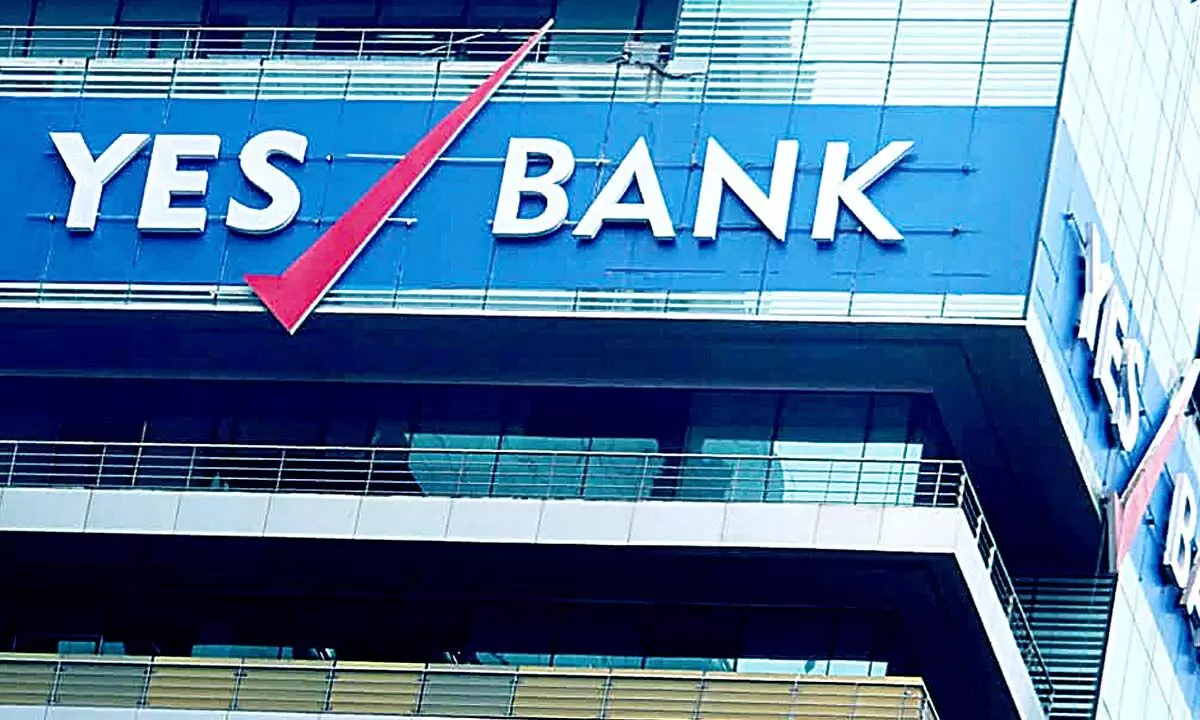Yes Bank scrip on verge of selling as 3-yr lock-in ends today
If the apex court orders the bank to pay up bondholders, Yes Bank will face an outflow of Rs8,400 crore; This uncertainty is the biggest burden weighing on the stock now, which is down 21% since Jan 2023
image for illustrative purpose

Mumbai: Shares of Yes Bank may face selling pressure as the Reserve Bank-mandated three-year lock-in period for individual investors and exchange-traded funds is ending on Monday, according to analysts.The analysts expect distress on the bank counter on Monday as they expect investors, primarily the nine banks led by State Bank, which picked up almost 49 per cent of its stocks in March 2020 for Rs 10 per share -- at a premium of Rs 8 on the face value as part of the RBI bailout, making an exit. Exchange-traded funds are also likely to press the exit button. Together, as much as 1.35 billion shares are with individual investors -- including retail, HNIs and NRIs -- under the lock-in and another 67 million with exchange-traded funds, and all these are likely to exit if not at one go over the next few weeks, according to analysts.
As of December 2022, SBI held 26.14 per cent or 6,050 million shares of Yes Bank; HDFC & HDFC Bank and ICICI Bank held 1,000 million shares each; Axis Bank 600 million; Kotak Mahindra Bank 500 million; Federal Bank and Bandhan Bank 300 million each and IDFC First Bank held 250 million shares before it went belly up on March 5, 2020. These eight banks held originally almost 11 billion shares in the bank. That apart, SBI AMC holds 23.67 million of Yes Bank shares in its Nifty 50 ETF, Kotak AMC holds 11.99 million, Nippon India has 10.56 million, SBI ETF of Bank Nifty has another 6.72 million and UTI AMC holds 5.89 million.
However, the majority of these banks have already sold almost 25 per cent of their holding in the bank, which were not under the lock-in. SBI has pared its stake between June and December 2022 from 30 per cent to 26.14 per cent. As of June, ICICI Bank held 3 per cent; Axis Bank, IDFC First Bank and Bandhan Bank held between 1 and 2 per cent stake each in the lender. “Till March 2023, we are required to hold a 26 per cent stake in Yes Bank. If it all, our stake comes within 26 per cent till March 2023, I am quite okay with that. Beyond that, we've not thought at the board level. So, I am unable to comment anything relating to our further course of action,” SBI chairman Dinesh Khara had told analysts at the December quarter earnings call. Even since the crisis, the stock has been trailing and closed at Rs 16.50 on BSE, down 0.3 per cent last Friday. But this is nearly a 65 per cent premium over their buy value.
At Friday's closing price, these shares with the banks are worth more than Rs 18,200 crore, which is an 80 per cent premium. It can be noted that under the RBI's rescue plan, these nine financial entities had infused Rs 10,000 crore in Yes Bank. They were mandated to hold these 75 per cent of their shares bought as part of the rescue plan for three years. Yes Bank was taken over by the central bank on March 5, 2020 and sold to a consortium of banks after a dramatic rise in toxic assets, which jumped to over 26 per cent. Last week a news report said SBI was looking to bring down its stake once the lock-in period ends.

